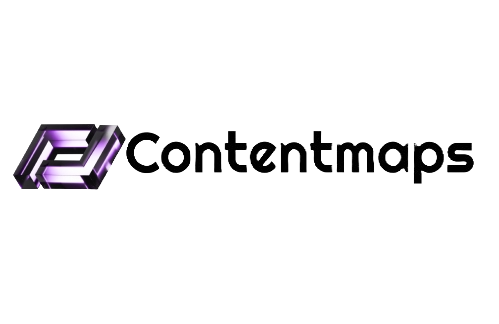Docs
Create Content Clusters from Reddit Discussions with Contentmaps AI
Reddit Map is a comprehensive analytics platform for understanding Reddit discussions and trends. It functions as an advanced data analysis system, providing insights into user conversations, sentiment analysis across various topics, and content preferences within the Reddit ecosystem.
Starting Your First Reddit Map Project
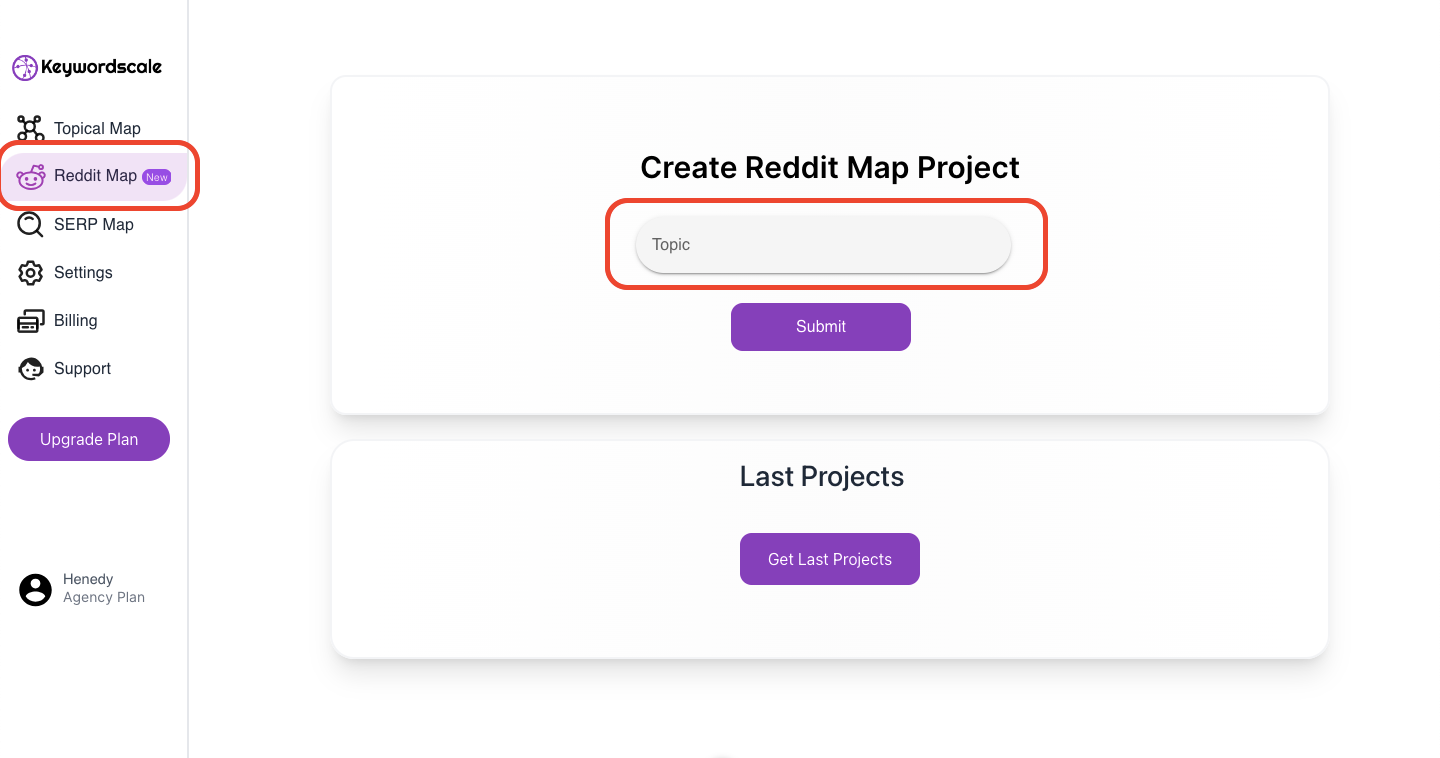
- Click on "Reddit Map" in the left menu
- Enter the subreddit, keyword, or topic related to your brand or website (for example, "SaaS")
Reddit Topical Map Dashboard
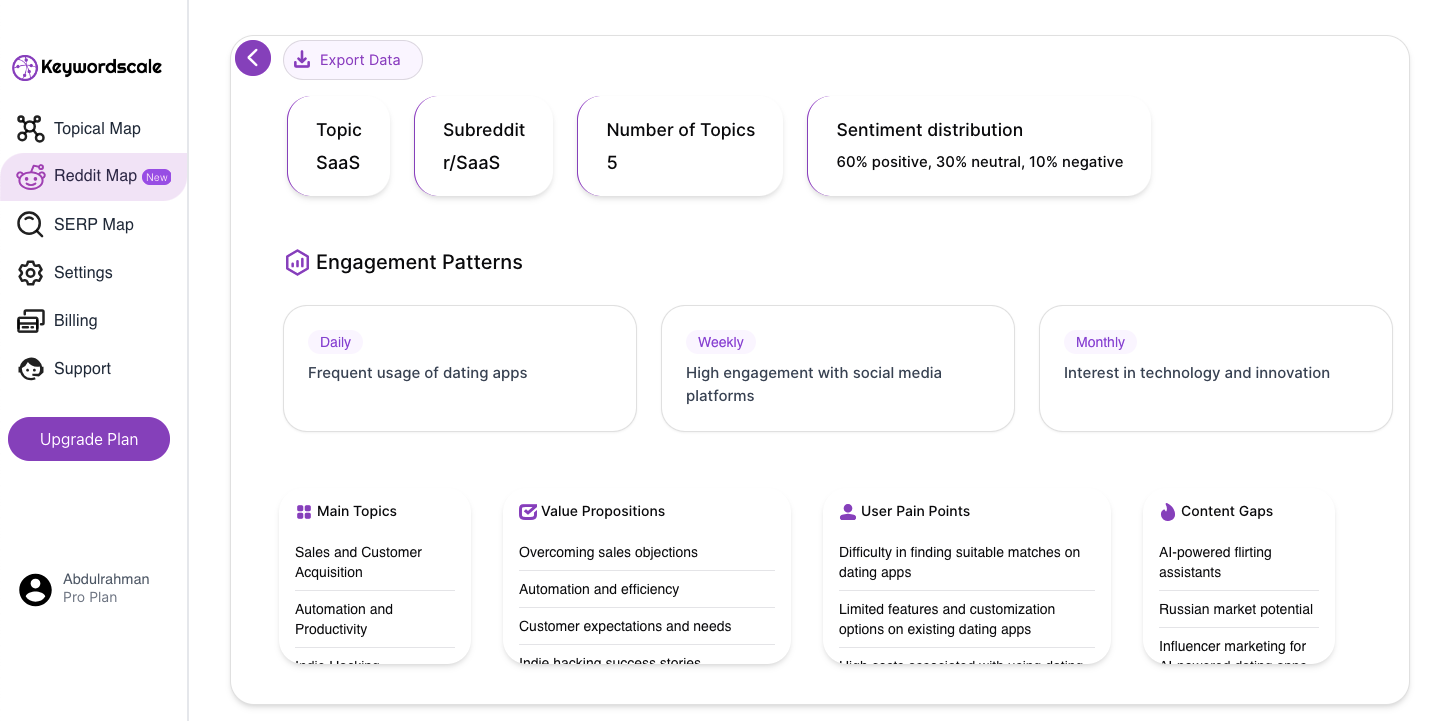
At the top of your screen, you'll see cards showing:
- Which Subreddits you're looking at
- How many topics we found
- Value propositions your brand can leverage and potential content gaps to fill.
- How people generally feel about these topics (happy 😊, neutral 😐, or unhappy ☹️)
Engagement Patterns 📈
We show you when people are most active:
- Daily Activity: What happens every day?
- Weekly Patterns: How discussions change through the week
This helps you know the best times to post or engage with the community.
Content Topics 📑
We organize everything people talk about into neat categories such as:
- Work automation
- Sales tips
- Starting a business
- Product creation
- AI and learning
Pain Points and Opportunities
We help you understand:
- What problems people are trying to sole
- What they're struggling with
- What kind of help they're looking for
This insight is invaluable for creating content that resonates with readers and performs well on Google and other search engines.
The Reddit Map Topical Map Navigator
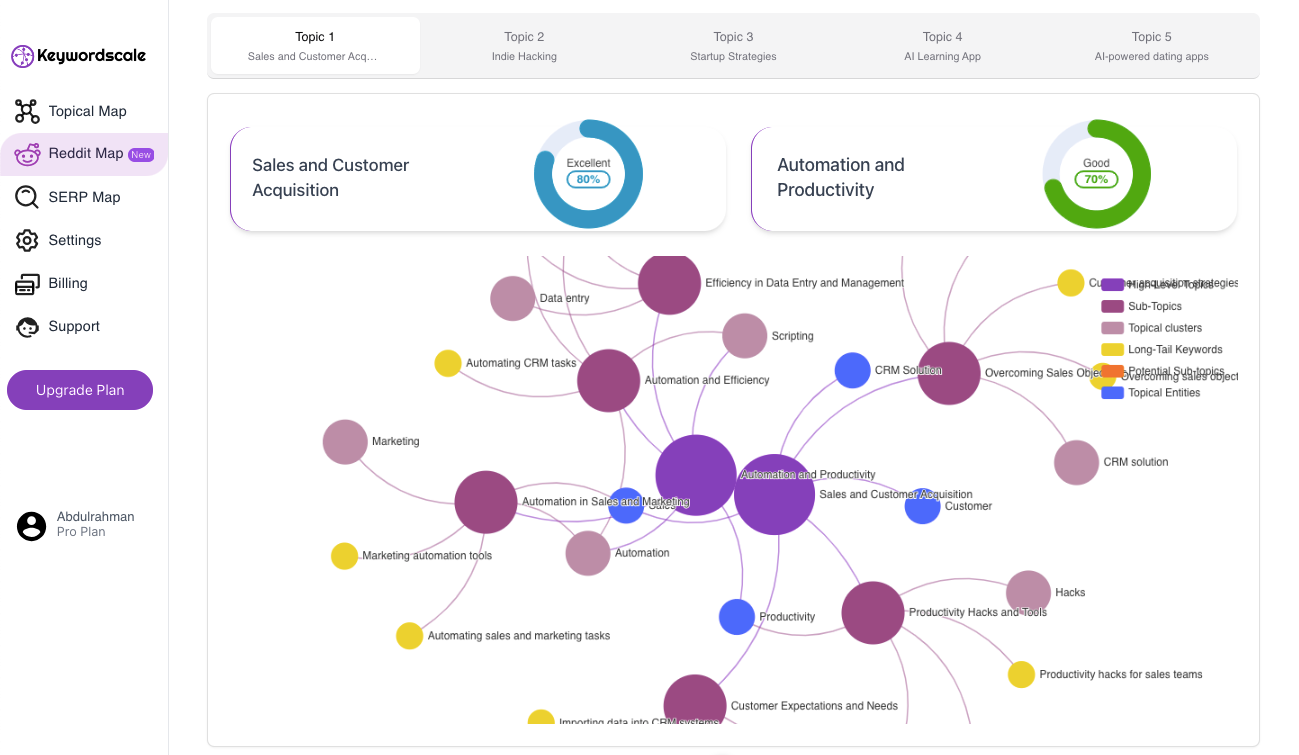
Think of this as your content GPS. It shows you:
- Main topic clusters (the big circles)
- Related subtopics (smaller circles)
- Connections between topics (the connecting lines)
- Content gaps to fill (potential topics)
- High-Level Topics: Primary subject areas and focus points of your website
- Sub-Topics: Specific subtopics and their sub-categories that make up each high-level topic
- Topical Clusters: Groups of closely related subtopics forming natural content hubs
- Long-Tail Keywords: Emerging or niche topics ripe for expansion
- Potential Sub-Topics: Gaps or underdeveloped areas presenting content opportunities
Note: You can interact fully with the topical map by zooming in/out, hiding certain categories (e.g., Topical Clusters) with a click, and focusing on specific elements.
Clustered Keywords Analysis
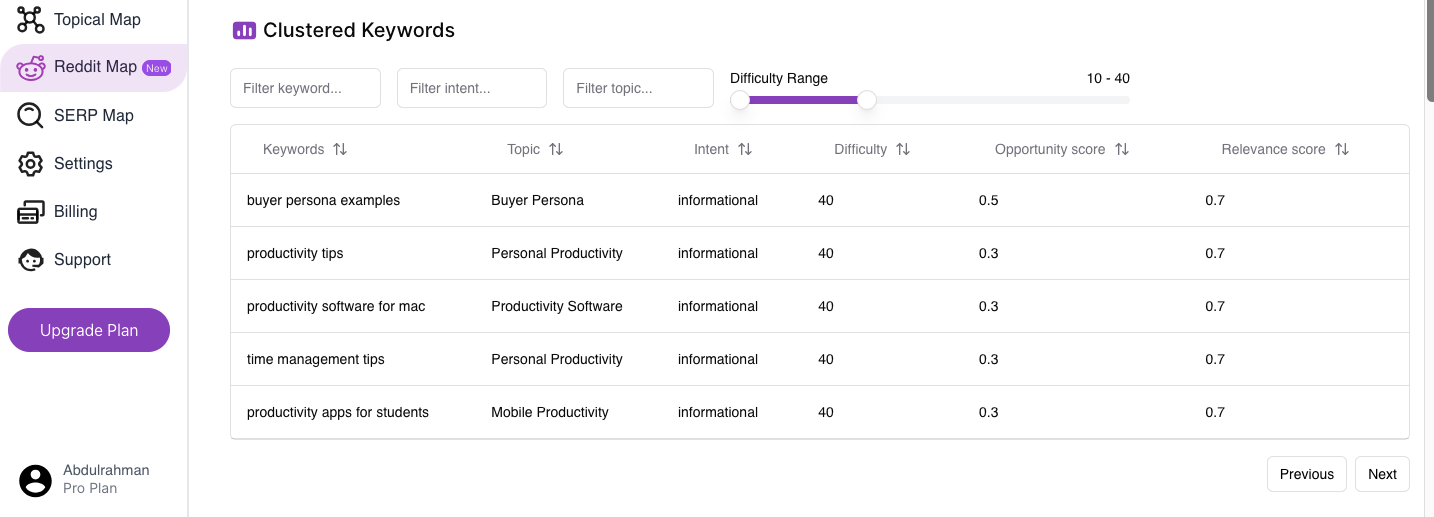
Our platform analyzes your domain and organizes keywords into meaningful clusters, providing:
- Difficulty scores (range: 10-58)
- Opportunity scores
- Relevance scores
- Topic categorization
- Intent classification (Informational, Navigational)
Each keyword cluster includes:
- Primary keywords
- Related topics
- Intent analysis
- Difficulty assessment
- Opportunity scoring (0.0-1.0 scale)
- Relevance metrics (0.0-1.0 scale)
Entity Intelligence
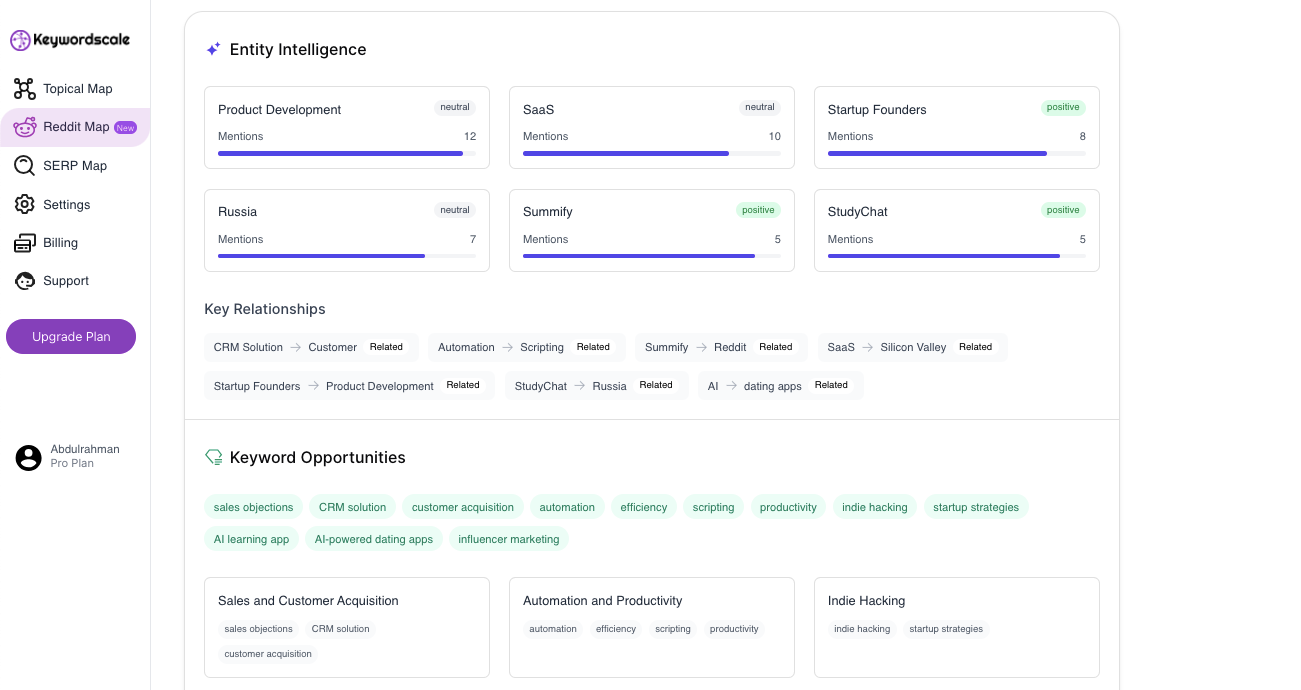
Our Entity Intelligence system automatically identifies and maps key relationships within your industry's ecosystem. This feature provides dynamic insights that adapt based on your domain and market:
How It Works
- Our AI analyzes the main subreddits to identify key entities
- Relationships between top entities are automatically mapped and scored
- Progress bars indicate the strength and relevance of each entity
- Connections are visualized with directional arrows showing relationship flow
Key Features
- Dynamic Entity Detection: The system automatically identifies relevant business entities, tools, and concepts specific to your industry
- Relationship Mapping: Visualizes how different entities connect and influence each other
- Strength Indicators: Progress bars show the relative importance and strength of each entity
- Automated Updates: Entity relationships evolve as your market changes
Understanding Your Results
- Entity Categories: Entities are grouped by their role and function in your ecosystem
- Relationship Explanations: Each connection includes a brief description of how entities relate
- Bi-directional Analysis: See both incoming and outgoing relationships for each entity
- Industry Context: Understand how local and industry-specific factors influence entity relationships
Using Entity Intelligence
- The review identified entities for your industry
- Explore relationship descriptions to understand connections
- Use strength indicators to prioritize focus areas
- Monitor relationship changes over time
- Leverage insights for strategic planning
The entities and relationships shown will be unique to your industry and domain, providing personalized insights for your specific business context.
Sentiment Analysis

Track and analyze content performance with:
- Dynamic data updates
- Sentiment distribution
- Percentage-based metrics
- Trend analysis
- Discussion monitoring
Competitive Intelligence
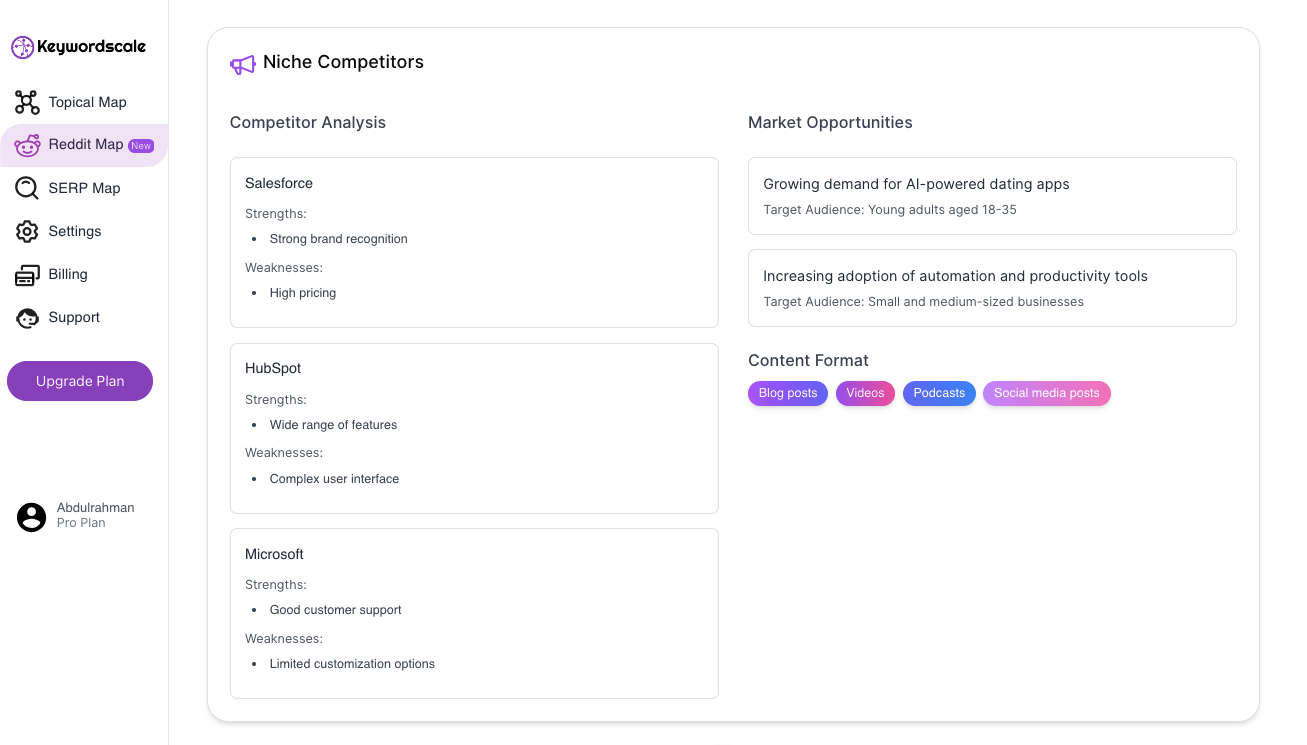
Analyze your market position with:
- Detailed competitor analysis
- Strength/weakness evaluation
- Market opportunity identification
- Target audience insights
- Content format recommendations
Content format options include:
- Blog posts
- Videos
- Podcasts
- Infographics
- Social media posts
Best Practices
- Start with easier topics (lower difficulty scores) when creating content
- Analyze competitor strengths and weaknesses
- Identify content gaps and opportunities
- Address common pain points in your content
- Keep an eye on related subreddits for new opportunitie
- Monitor sentiment trends
- Track user engagement metrics
- Optimize based on performance data
Making the Most of Reddit Map
Daily Tasks
- Check the sentiment analysis to understand how people feel
- Look at trending topics to stay current
- Review related subreddits for expansion opportunities
Weekly Tasks
- Review engagement patterns
- Plan content based on identified gaps
- Check how your difficulty scores are changing
